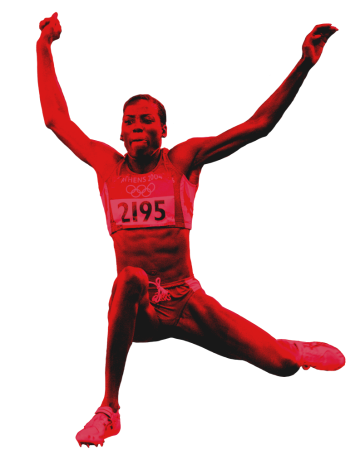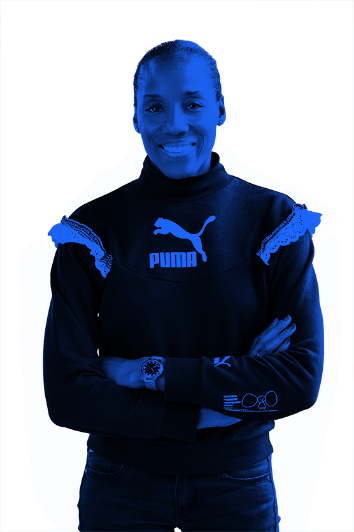

Fiona May Oly is member of the PUMA Supervisory Board and a retired Italian track and field athlete who competed in long jump. She won the World Championships twice and two Olympic silver medals. In 2005, she retired from competitions.
Fiona graduated from the University of Leeds, studying economics, business management and administration. She holds an Executive Master in Sports Governance from the University of Limoges. Fiona is now pursuing a successful career as a TV and theatre actress in Italy and is also a consultant for integration at the Italian Football Federation. She is the fourth vice-president of the Fair Play and Social Responsibility committee at UEFA.
PUMA talked to Fiona about what was crucial for her to be successful in her athletic career and beyond.
Fiona, at what stage in your life did you realize that you wanted to be a professional athlete?
I think I realized that I wanted to be a top athlete – professionalism didn't exist – by the time I was 17 years old. I had just won the European Junior Championships and that’s when I knew that I should take it seriously.
How much of your success was down to talent and how much to training hard?
I believe talent counts between 40 to 50 percent. The rest is down to training hard. I believe that we are all talented in some way or another, but it’s the one that works or trains hard that stands out from all the rest. Plus a pinch of luck!
How did you manage to stay motivated during training ahead of a major competition?
That’s the hardest part. There are times when the training is so hard and the competition is so far away that it’s difficult to keep motivated. I just take one day at a time with the main goal stuck in my mind. I also do a lot of meditation and visualization during my preparation.
How important is preparation in order to perform at your best?
It is very important! Especially in athletics as it’s an individual sport and it’s also mental. I normally strategize before a major competition. I take into consideration all the factors, positive and negative. In the long jump, there’s always an element of surprise. For example, I didn't expect to lose a Gold medal due to a human error in 1999 World Championships in Seville. (Editor’s note: The Spanish athlete Niurka Montalvo took the lead from Fiona with a jump that was approved by the judge, but the video replay clearly showed the tip of her toe extending over the line when taking off.)
What were the most difficult moments in your career?
I had quite a few difficult moments in my career at various degrees. The first, in 1993, was that the British Federation did not support me to go abroad and train. I found an Italian coach that could take me to the next level and be a major medal contender. With that and my determination, I decided to change countries as I was already married to an Italian athlete.
The second was when I “lost” the gold medal in Seville in 1999. I really wanted to give up. I know it sounds very personal, and it was personal. It was a scandal and believe me: as I was to receive the silver medal on the podium, the Spanish spectators booed and shouted, which wasn't the best experience. So, I was pretty disillusioned.
The third was in 2001. I think it was due to the fact that I was mentally tired after winning another Silver medal (yes, behind the great Heike Drechsler!) at the Sydney Olympic Games. The season wasn’t going too well. The sports journalists had a way of criticizing athletes without even asking them. For the media, it was just the results that talked. I was considered to be finished, end of career. Fortunately, I took it as a challenge to prove them wrong. I won the Gold medal at the World Championships in 2001 and I still don’t talk to journalists until this day.
How important do you think it is to learn from your mistakes?
It’s very important to learn from mistakes. It’s very difficult to be really honest about oneself. I am still trying to find out my good, best and bad points. I think that we must take responsibility for our own actions. Easier said than done. I’m not perfect and I still make mistakes, but I try to learn from them.
What advice would you give an upcoming athlete who wants to make it to the top?
It’s a journey and a very long one. It will be bumpy and sometimes heartbreaking, as we are only human. But the satisfaction when you obtain the results is the best emotion in the world. It’s well worth it. Never be too afraid to learn about yourself. Follow that dream, listen to no one, but only to that little voice inside of you.
After you had ended your athletic career, you became a successful actress. Is performing on a theatre stage or film set in any way similar to the performance in a stadium?
I’m an actress in progress! I didn't have any formal training, but adapting the same principle as being an athlete seems to have worked. In film and television, it’s easier because you can repeat and be nearly perfect. I had to work really hard as Italian isn't my first language, so I really had to practice. Working in theatre is much, much harder. Here, there’s only you and the audience who are completely different. But I found that theatre is similar to competing. You have only one chance. If you miss it, it’s gone.
What is more fun: athletics or acting?
Both are fun! I have to admit that I am so grateful that I have these experiences.
Thank you, Fiona.